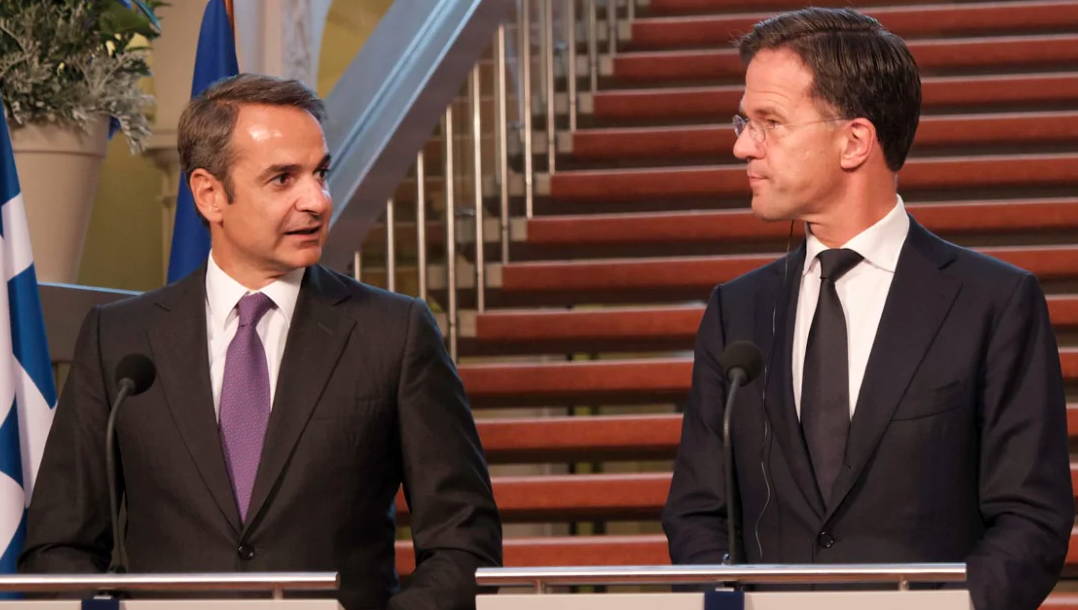Today, NATO’s newly appointed Secretary General, Mark Rutte, makes a key geopolitical stop in Athens. With the world facing new tensions—from the ongoing war in Ukraine to nuclear threats and shifting global alliances—the talks between Rutte and Greek Prime Minister Kyriakos Mitsotakis are poised to address pressing concerns on the Ukrainian front and NATO’s evolving defense strategies.
At 12:00, Rutte will meet Mitsotakis for the first time since assuming his NATO role. Although Rutte previously visited Greece as the Prime Minister of the Netherlands, today marks his first official meeting in his new capacity. His visit will also include meetings with Minister of Defense Nikos Dendias and Minister of Foreign Affairs Giorgos Gerapetritis.
Discussions on NATO’s Role in Ukraine’s Defense
The primary focus of Rutte’s visit will be Ukraine, with discussions likely centering on NATO’s role in strengthening the defense of Kyiv. In light of the ongoing war and recent escalations from Russia, NATO is working on ways to support Ukraine without compromising its own strategic priorities. One of the critical issues will be how to manage the growing calls from the U.S. for a peace agreement, as well as the challenge posed by Russia’s continued military actions. The pressure is on NATO to formulate solutions that will provide Ukraine with the resources to protect itself, as the situation on the ground becomes increasingly dire.
Rutte’s visit comes on the heels of a meeting he had in Ankara and a weekend discussion with former U.S. President Donald Trump. These interactions highlight the balancing act NATO faces as it works to manage diverse viewpoints within its ranks.
Mitsotakis and NATO’s Defense Strategy: Ukraine and Beyond
The ongoing war in Ukraine continues to shape Western foreign policy, and Mitsotakis has been vocal about the goals of the West. In recent conversations, including with French writer Pascal Bruckner, Mitsotakis outlined his views on a potential peace deal. He emphasized that any peace agreement should not come at the expense of Ukrainian sovereignty and territory, stating that the priority is to ensure Ukraine can defend itself and prevent further loss of territory. “A Ukrainian victory might seem optimistic, but we must give them the means to stand their ground,” Mitsotakis noted.
Greece has made it clear that while it supports Ukraine, it will not compromise its own defense needs in the process. This distinction is crucial as NATO grapples with how to balance member nations’ resources and commitments.
European Defense: The Role of NATO and Greece’s Contribution
The conversation surrounding NATO’s defense spending is also expected to come up, particularly in light of growing American pressure for increased defense budgets among member states. Greece, however, already spends 3% of its GDP on defense, with 23 of the 32 NATO countries now spending at least 2% due to the war in Ukraine. This positions Greece favorably in the ongoing discussions about defense budgets and NATO’s strategic direction.
Mitsotakis is expected to continue advocating for Europe’s strategic autonomy, especially in light of the changing political landscape in the U.S. and the aftermath of the recent US elections. Greece has long supported the idea of a European defense strategy, and Mitsotakis, alongside Polish Prime Minister Donald Tusk, has proposed leveraging European resources to create an air defense shield for the continent.
A Unified NATO Defense Strategy Moving Forward
At the core of today’s discussions will be Europe’s defense strategy. Mitsotakis has consistently argued that Europe must move beyond a posture of strategic naivety and make concrete decisions regarding common defense, a topic that will resonate strongly with NATO as it prepares for the challenges of the coming years.
Ask me anything
Explore related questions





